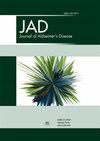Depression and Agitation Factors Are Related to Regional Brain Atrophy and Faster Longitudinal Cognitive Decline in Mild Cognitive Impairment
IF 3.4
3区 医学
Q2 NEUROSCIENCES
引用次数: 0
Abstract
Background: Neuropsychiatric symptoms (NPS) are a common aspect of Alzheimer’s disease (AD). Multiple studies have investigated its brain correlates, but it still remains unclear how they relate with brain atrophy in mild cognitive impairment (MCI). Objective: Our objective was to investigate brain volume in MCI patients as a function of NPS. Methods: We measured grey matter volume, neuropsychological status and NPS (Neuropsychiatric Inventory, NPI), in a sample of 81 MCI patients (43 females). Participants were divided in groups depending on presence (NPS+) or absence (NPS–) of NPS and on type of NPS. Results: We found lower volume of left temporal pole in patients with depression compared to NPS– (p = 0.012), and in patients with agitation compared to NPS– in the right middle occipital gyrus (p = 0.003). We also found a significant correlation between volume of left temporal pole and MMSE (r (78) = 0.232, p = 0.019). Finally, NPS+ presented lower cross-sectional cognitive level than NPS– (t (79) = 1.79, p = 0.038), and faster cognitive decline (t (48) = –1.74, p = 0.044). Conclusions: Our results support the colocalization of structural damage as a possible mechanism underlying the relationship between MCI and depression and provide novel evidence regarding agitation. Moreover, our longitudinal evidence highlights the relevance of an adequate identification of NPS in MCI patients to identify those at risk of faster cognitive decline.抑郁和躁动因素与轻度认知障碍患者的区域性脑萎缩和更快的纵向认知能力衰退有关
背景:神经精神症状(NPS)是阿尔茨海默病(AD)的常见症状之一。多项研究对其大脑相关性进行了调查,但仍不清楚它们与轻度认知障碍(MCI)脑萎缩之间的关系。研究目的我们的目的是研究 MCI 患者的脑容量与 NPS 的关系。研究方法我们测量了 81 名 MCI 患者(43 名女性)的灰质体积、神经心理状态和 NPS(神经精神量表,NPI)。根据存在(NPS+)或不存在(NPS-)NPS以及NPS的类型将参与者分为不同的组。研究结果我们发现抑郁症患者的左颞极体积低于NPS-患者(P = 0.012),而躁动症患者的右枕中回体积低于NPS-患者(P = 0.003)。我们还发现左颞极的体积与 MMSE 之间存在明显的相关性(r (78) = 0.232,p = 0.019)。最后,NPS+ 的横截面认知水平比 NPS- 低(t (79) = 1.79,p = 0.038),认知能力下降更快(t (48) = -1.74, p = 0.044)。结论我们的研究结果支持将结构性损伤作为 MCI 与抑郁之间关系的可能机制,并提供了有关躁动的新证据。此外,我们的纵向证据还强调了在 MCI 患者中充分识别 NPS 的重要性,以识别那些有认知能力加速衰退风险的患者。
本文章由计算机程序翻译,如有差异,请以英文原文为准。
求助全文
约1分钟内获得全文
求助全文
来源期刊

Journal of Alzheimer's Disease
医学-神经科学
CiteScore
6.40
自引率
7.50%
发文量
1327
审稿时长
2 months
期刊介绍:
The Journal of Alzheimer''s Disease (JAD) is an international multidisciplinary journal to facilitate progress in understanding the etiology, pathogenesis, epidemiology, genetics, behavior, treatment and psychology of Alzheimer''s disease. The journal publishes research reports, reviews, short communications, hypotheses, ethics reviews, book reviews, and letters-to-the-editor. The journal is dedicated to providing an open forum for original research that will expedite our fundamental understanding of Alzheimer''s disease.
 求助内容:
求助内容: 应助结果提醒方式:
应助结果提醒方式:


